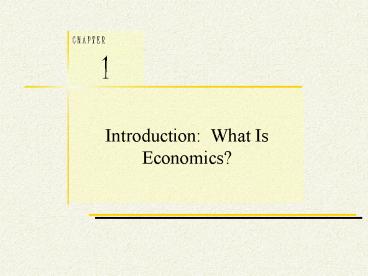Introduction: What Is Economics - PowerPoint PPT Presentation
1 / 16
Title:
Introduction: What Is Economics
Description:
Economics studies the choices that can be ... Isolate variables Ceteris Paribus ... The expression ceteris paribus means that the effect of other tendencies is ... – PowerPoint PPT presentation
Number of Views:49
Avg rating:3.0/5.0
Title: Introduction: What Is Economics
1
Introduction What Is Economics?
2
What Is Economics?
- Economics studies the choices that can be made
when there is scarcity. - Scarcity is a situation in which resources are
limited in quantity and can be used in different
ways.
3
What Is Economics?
- Because our resources are limited, we must
sacrifice one thing for another. - Economists are always reminding us that there is
scarcitythat there are tradeoffs in everything
we do.
4
Positive versus Normative Analysis
- Positive economics predicts the consequences of
alternative actions, answering the questions,
What is? or What will be?
5
Positive versus Normative Analysis
- Normative economics answers the question, What
ought to be? Normative questions lie at the
heart of policy debates.
6
Decisions in a Modern Economy
- Economic decisions are made at every level in
society. - The choices made by individuals, firms, and
governments answer three questions - What products do we produce?
- How do we produce the products?
- Who consumes the products?
7
Economic Analysisand Modern Problems
- Economic analysis provides important insights
into real-world problems. - Economists attempt to diagnose and provide
solutions to problems such as traffic congestion,
poverty in Africa, or the problems of an entire
economy.
8
The Economic Way of Thinking
- The economic way of thinking is best summarized
by British economist John Maynard Keynes
(1883-1946) as follows - The theory of economics does not furnish a body
of settled conclusions immediately applicable to
policy. It is a method rather than a doctrine,
an apparatus of the mind, a technique of thinking
which helps its possesor draw correct
conclusions.
9
The Economic Way of Thinking
- Three elements of the economic way of thinking
- Use assumptions to simplify
- Eliminate irrelevant details and focus on what
really matters. Keep in mind that simplifying
assumptions do not have to be realistic.
10
The Economic Way of Thinking
- Three elements of the economic way of thinking
- Isolate variablesCeteris Paribus
- Economists are interested in exploring
relationships between two variables. A variable
is a measure of something that can take on
different values. - The expression ceteris paribus means that the
effect of other tendencies is neglected for a
time.
11
The Economic Way of Thinking
- Three elements of the economic way of thinking
- Think at the margin
- A small, one-unit change in value is called a
marginal change. - Economists use the answer to a marginal question
as the first step in deciding whether to do more
or less of something.
12
The Economic Way of Thinking
- A key assumption of most economic analysis is
that people act rationally, meaning that they act
in their own self-interest. - Rational people respond to incentives.
13
Preview of Coming AttractionsMicroeconomics
- Microeconomics is the study of the choices made
by households, firms, and government, and of how
these choices affect the markets for goods or
services.
14
Preview of Coming AttractionsMicroeconomics
- We can use microeconomic analysis to
- Understand how markets work and predict changes.
- Make personal and managerial decisions.
- Evaluate public policies.
15
Preview of Coming AttractionsMacroeconomics
- Macroeconomics is the study of the nations
economy as a whole. - We can use macroeconomic analysis to
- Understand why economies grow.
- Understand economic fluctuations.
- Make informed business decisions.
16
Coming Up (Ch. 2) Producing Trading































